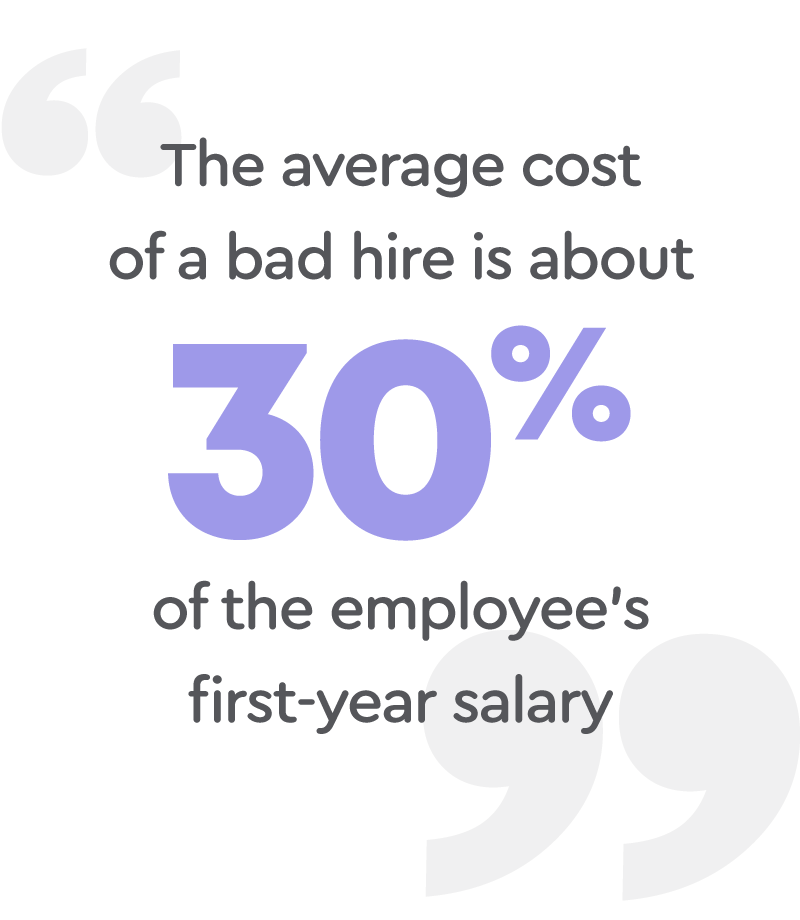What Really Happens When You Hire the Wrong Candidate?

No hiring process is foolproof – the wrong candidate will occasionally slip through your precautionary filters unnoticed. Opportunities for that to happen are amplified further during any transitional period, like the one to remote operations. That’s because during that transition, traditional screening methods lose their effectiveness, increasing the potential for incompatible talent to disrupt your effective workforce.
These potential bad hires pose a great financial risk to your business – the average cost is about 30% of the employee’s first-year salary, with half of businesses spending even more. And that expense extends well-beyond just cold hard cash, especially in today’s climate.
Let’s take a look at the key impacts that hiring the wrong candidate has on your organization outside of cost, along with a few ways to revamp your processes and target stronger talent.
Reduced Productivity
The move to remote work arrangements has not hindered productivity – in fact, just the opposite has occurred. Surveys indicate that 95% of employers are seeing steady or increased productivity levels within their workforce. Great for your current team, but what about any new additions?
If your company knows how to effectively screen and onboard remote candidates, your top performers won’t miss a beat. If you’re still adjusting to the remote first world, you could see an immediate drop in productivity if you add the wrong person to your team.
Let’s say a new hire, unbeknownst to you, is a poor communicator. Maybe they stop reaching out when they’re under pressure or are too proud to ask questions when they encounter unfamiliar practices or challenges.
With the communication platforms that are central to remote operations, it’s easier for them to ignore messages or make excuses to not engage when you can’t physically swing by their desk to discuss what’s holding them up. These bottlenecks pile up quickly – and before you have time to address them, a bad hire can derail deliverables and slam the brakes on your team’s existing momentum.
Increased Tension
Office conflict isn’t unique to remote work – assemble the wrong combination of people and you’re bound to witness more strife at the water cooler than usual. However, when you make a bad hire during a time of heightened emotions, like during a global pandemic or a controversial election year, there’s a higher risk that antithetical personalities will more regularly rub each other the wrong way.
Stress from today’s “outside” factors has shortened fuses and created greater job burnout. A recent survey shows that over 69% of people working from home during the COVID-19 crisis experience job burnout.
The anxiety of becoming sick, the monotony of spending days on end at home, and the consistent political tensions are combining to push people to their breaking point. Now, add a bad hire to the team that disrupts the team’s ability to perform, and watch conflict erupt – sometimes before you even realize there was a spark.
Remote work arrangements also make developing and maintaining team morale difficult. Non-verbal conversation cues are easily lost when the majority of interactions occur via tech. Conversations can quickly turn blunt, passive aggressive, or cutting, causing coworkers to feel less empathy and forgiveness towards one another, and poisoning critical rapport and relationships.
Improve Remote Candidate Screening
For companies to avoid hiring a ticking time bomb, it’s important to adopt remote-friendly hiring processes. On-site interviews allowed hiring managers and colleagues to gauge the temperament and communication style of potential candidates – today, businesses need tools to properly evaluate those same skills to determine culture fit.
Partnering with a remote interviewing software helps companies nationwide do just that. Solutions like interview builder allow businesses to ask the right questions and identify top candidates 20% more effectively. Additionally, one-way video interviews give candidates the stage to confidently answer your questions, providing you with more insight to work with than a simple resume, but taking less time than a phone or two-way video interview.
More than ever, implementing tools to help your business finetune your candidate screening processes will ensure that your teams work together as effectively as possible. Don’t let the wrong candidate slip through to not only cost your team (and your company) financially, but also in productivity and morale. Learn more about how your remote workforce can screen more effectively for new coworkers now, when you sign up for your demo of the interviewstream.
About The Author
Esteban Gomez is a marketing consultant with interviewstream. He loves learning and has a passion for traveling, having visited many countries including China, Colombia, Italy, and Peru.
